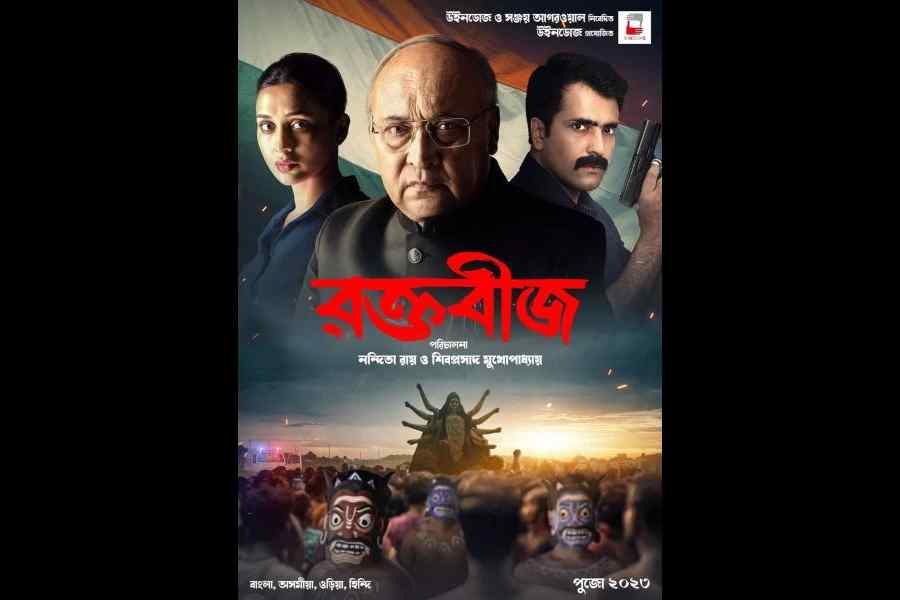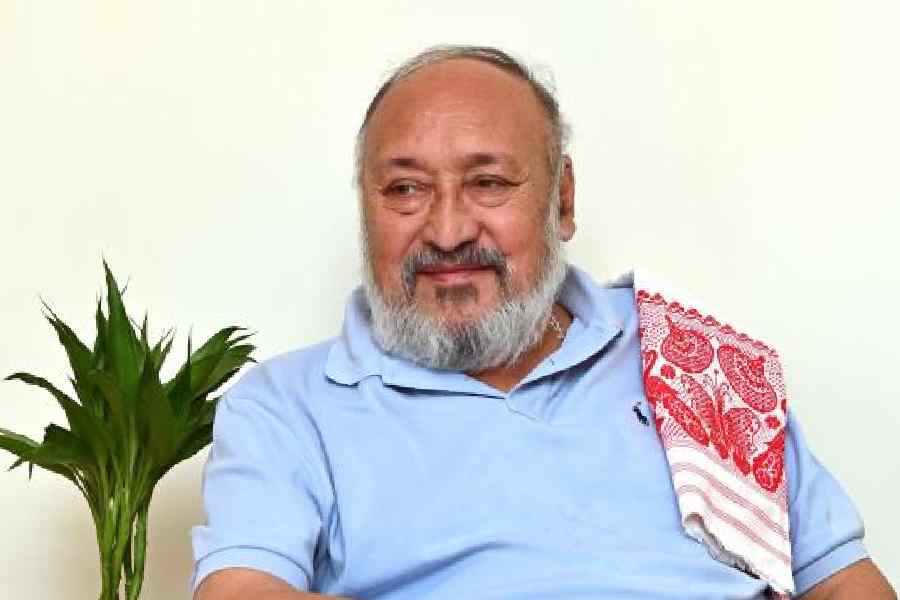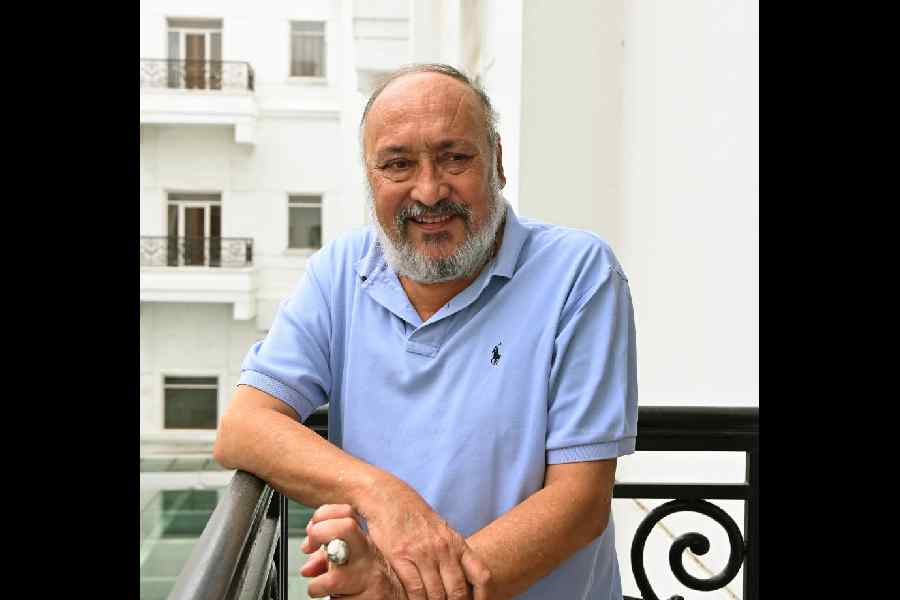t2oS met the evergreen star Victor Banerjee — who celebrates his 77th birthday today — and chatted with him as he shared his thoughts about Windows Productions’ latest film Raktabeej, Bengali cinema, Calcutta memories, his life in Landour, and his own remarkable journey. Excerpts.
Tell us about your character in Raktabeej…

Raktabeej (2023) film poster
My character is based on Pranab Mukherjee, when he was President of India. So I play the role of the Rashtrapati. Like him, my character is very fond of his hometown and returns every year to perform Chandi Paath during Durga Puja at his ancestral home. The story centres on the conspiracy that surrounds his visit to his hometown and the violence that we have to deal with these days.
Do share with us any memorable experience you had while shooting this film.
It was a pleasure to work with Anashua (Majumdar), who I have known in the past and who is a very good actress. I must also mention Abir (Chatterjee), who I think is a powerful young actor. It was nice to meet Anashua for old times’ sake and Abir for the energy, sincerity and dedication that I was glad to see in a young man. It was heartening to find that he has no airs in spite of all the stardom he enjoys.
How was it like being directed by Shiboprosad Mukhopadhyay and Nandita Roy?
Oh, it was very simple and smooth really. They knew exactly what they wanted and communicated it with great clarity, after which we would go ahead with a shot. They weren’t demanding at all as directors but were very easy to work with.
Would you be working on more Bengali films now?
Not at the moment as there’s nothing on the cards, but let’s see…
You have directed films in the past. Are there any plans to direct films again?
There’s a fair chance. Over the last two years, I have been dormant owing to health problems. I have just recovered from all that. Over the last couple of months, I am just beginning to re-energise my batteries and I hope to become a creative old man again from next year (smiles).
This being the centenary year of Mrinal Sen, what are your memories of Mahaprithibi?
First and foremost, I must say Mrinal was a very vulnerable and good human being. He was a softy in many ways. The Leftist image in which he is portrayed is, in my opinion, just a social prank and also maybe because of the time during which he made his entry into films. I knew both Sen and his wife Gita personally; they were a marvellous, loving couple. It is ironical that such a simple, nice person had to live with the burden of a label being shoved on to him, and which was difficult to get rid of. But he was an intelligent person, a student of physics, so he knew how to solve the problems that others created for him.
As for Mahaprithibi, what I wish to talk about is that I found many people trying to sabotage the film. That was my first experience of seeing petty-mindedness in a crew, which was all the more shocking as Mrinal babu’s crew was top-notch. By then he was a well-known, internationally acclaimed director, yet there were people conniving to jeopardise good work, perhaps because his view of socialism as represented in the film, didn’t go down well with them.
Do you go to the theatres now to watch films?
I usually avoid going to the theatres and have seen very few films in theatres. But after 27 years, I went to see a film which I thoroughly enjoyed and loved. It’s called Bahubali 2.
Do you watch shows on OTT? Which are your favourites?
I don’t watch movies at all. I happen to be in the profession and so I do what I do. But I am not in the habit of watching films or web series.
What are you reading now?
(Laughs) Lately, I have been reading the poetry collections of Ilya Kaminsky, a Ukrainian-born poet who is now based in America. He is hearing impaired and I find his poems quite inspiring yet frightening. His poetry tells you a lot about the violence and the bloodshed that is going on around the world, whether it’s in Ukraine, India or even in Bengal. He has, however, a very humane approach to the violence that we have to live with and how we are all deaf to it in spite of the noise it makes around us.
Any upcoming projects that you are looking forward to…
Oh yes… in fact, I am now growing this beard for my role of Nizamuddin Auliya. And since I am a great fan of Karim’s (Mughlai restaurant), in Delhi’s Nizamuddin, I happily accepted the role to play the hero of the raans and kebabs that I have always enjoyed in Nizamuddin (grinning).I will be going to Orchha near Gwalior to work on it with a friend of mine called Kunal Malla who is from Dehradun. I have already worked for a film with him last year called Teachers Day. This film, as yet untitled, is being produced by Sony, and my role is for four days only, which is very good. I am looking forward to it because I know I love reciting historic lines that are written for posterity. “Dilli door ast” is one of the lines I have that everyone is familiar with and I shall wait to see how I deliver.
Since you are a self-confessed foodie, which are your favourite places to go to when in Calcutta?

Victor Banerjee
(Becomes wistful) Phuchka on Russell Street, Mocambo for old-style meals like prawn cocktails. The Bengal Club has a whole selection of lovely restaurants with great food; Calcutta Club because Bengalis are foodies and serve lovely food. I have spent glorious times in the restaurants of both these clubs. Then there’s a new place called Peter Hu? off Park Street that has wonderful cuisine. They have fabulous dishes and I am particularly fond of a dish in which there is a stick of sugarcane wrapped with pork which, is to die for.
Since you don’t stay in the city for long spells, what kind of changes do you observe in Calcutta when you return?
One good thing about Calcutta these days is that there is less garbage on the streets, maybe because we have a lady administrator in charge. It certainly is a cleaner and greener Calcutta and we must thank Didi for the upkeep of parks and gardens. Other than that, I am afraid, the spirit of Calcutta seems deflated. One can feel a certain hopelessness, maybe it was there earlier but now it seems deeper than ever. It is also disgraceful to still find people sleeping on the pavements and under flyovers. It is also beyond me how roadside kitchens are allowed to operate in abysmally filthy conditions. It is now all the more striking by comparison, as nowhere else will you find food being prepared in such unhygienic conditions though roadside fast food is popular all over India.
What kind of changes in Bengali cinema have you observed over the past decade or so?
I am strictly not a cinema-goer, but from what I have heard I can say that there are some very good new directors and actors. I am told that the garbage of totally commercial cinema repetitive of South Indian hits has considerably reduced.
Tell us about a typical day in your life in Landour.
A typical day is spent staring at the mountains and trees, chasing langurs and monkeys from my garden and making sure that the leeches don’t grab my legs and suck the blood out of me. I also love to watch the new leaves appear and new flowers bloom on my trees. I love to smell the air, the grass, and listen to the sounds made by the cicadas and crickets, the blackbirds and the owls. I live in a paradise of nature that is endowed with beauty and bounty and I enjoy it all for free. Nature has been my source of entertainment all my life and I am privileged that I have the best of it.
Landour is also home to Ruskin Bond for many years now. Do you meet him?
Yes, he is my neighbour, but I haven’t met him in the last two years. Covid has changed everyone’s life. For the last three years, he has been a recluse and he does not come out of his house anymore. These days he stays tucked away indoors and spends his days being pampered by his adopted family. What’s important is that he is well and that he is happy, content and still writing.











